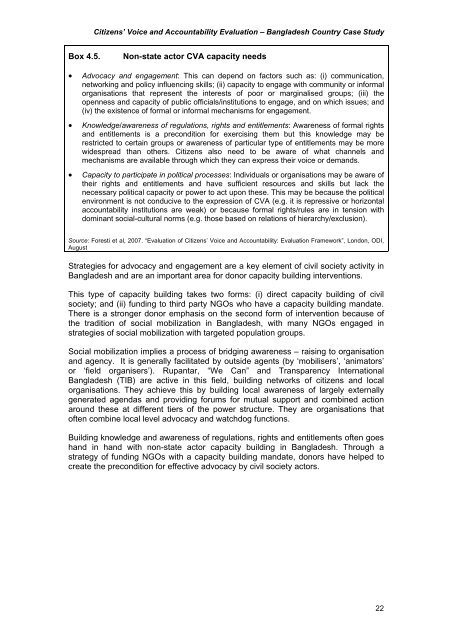Bangladesh - Belgium
Bangladesh - Belgium
Bangladesh - Belgium
You also want an ePaper? Increase the reach of your titles
YUMPU automatically turns print PDFs into web optimized ePapers that Google loves.
Citizens’ Voice and Accountability Evaluation – <strong>Bangladesh</strong> Country Case Study<br />
Box 4.5.<br />
Non-state actor CVA capacity needs<br />
• Advocacy and engagement: This can depend on factors such as: (i) communication,<br />
networking and policy influencing skills; (ii) capacity to engage with community or informal<br />
organisations that represent the interests of poor or marginalised groups; (iii) the<br />
openness and capacity of public officials/institutions to engage, and on which issues; and<br />
(iv) the existence of formal or informal mechanisms for engagement.<br />
• Knowledge/awareness of regulations, rights and entitlements: Awareness of formal rights<br />
and entitlements is a precondition for exercising them but this knowledge may be<br />
restricted to certain groups or awareness of particular type of entitlements may be more<br />
widespread than others. Citizens also need to be aware of what channels and<br />
mechanisms are available through which they can express their voice or demands.<br />
• Capacity to participate in political processes: Individuals or organisations may be aware of<br />
their rights and entitlements and have sufficient resources and skills but lack the<br />
necessary political capacity or power to act upon these. This may be because the political<br />
environment is not conducive to the expression of CVA (e.g. it is repressive or horizontal<br />
accountability institutions are weak) or because formal rights/rules are in tension with<br />
dominant social-cultural norms (e.g. those based on relations of hierarchy/exclusion).<br />
Source: Foresti et al, 2007. “Evaluation of Citizens’ Voice and Accountability: Evaluation Framework”, London, ODI,<br />
August<br />
Strategies for advocacy and engagement are a key element of civil society activity in<br />
<strong>Bangladesh</strong> and are an important area for donor capacity building interventions.<br />
This type of capacity building takes two forms: (i) direct capacity building of civil<br />
society; and (ii) funding to third party NGOs who have a capacity building mandate.<br />
There is a stronger donor emphasis on the second form of intervention because of<br />
the tradition of social mobilization in <strong>Bangladesh</strong>, with many NGOs engaged in<br />
strategies of social mobilization with targeted population groups.<br />
Social mobilization implies a process of bridging awareness – raising to organisation<br />
and agency. It is generally facilitated by outside agents (by ‘mobilisers’, ‘animators’<br />
or ‘field organisers’). Rupantar, “We Can” and Transparency International<br />
<strong>Bangladesh</strong> (TIB) are active in this field, building networks of citizens and local<br />
organisations. They achieve this by building local awareness of largely externally<br />
generated agendas and providing forums for mutual support and combined action<br />
around these at different tiers of the power structure. They are organisations that<br />
often combine local level advocacy and watchdog functions.<br />
Building knowledge and awareness of regulations, rights and entitlements often goes<br />
hand in hand with non-state actor capacity building in <strong>Bangladesh</strong>. Through a<br />
strategy of funding NGOs with a capacity building mandate, donors have helped to<br />
create the precondition for effective advocacy by civil society actors.<br />
22

















